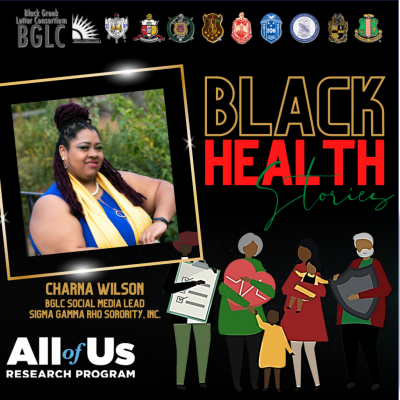Written by Charna F. Wilson
When you think about your health care, there are layers to it. Affordability, availability, and accessibility to name a few. And if you’re a person of color, race becomes one of those. Why? Because we don’t exactly have the best history when it comes to health care in this country. This stems from a lot of mistreatment over the years, environment, miseducation, but the gist of it is that my people have a history of having a harder time trusting and utilizing health care, including myself. Today, I know that Black Health is Wealth and that medical research isn’t the enemy. I know that programs like the All of Us Research Program are designed to make the future of health care better, not to hurt us. And I want you to know that as well. For that, I’m going to be transparent and tell you a bit of my personal health wealth story, in the hopes that it will empower you to embark on your own.
In 2019, my wealth was tested as I dealt with my health in the most unhealthy way. You see, I’ve dealt with a little “white coat syndrome” for two reasons. One, due to not feeling adequately seen or heard by health care providers and two, the fear of hearing the worst. They can’t tell you you’re dying if you don’t talk to them, right? Except I was dying, and I had no idea.
For months I’d been dealing with a very irregular menstrual cycle and my flow was more than heavy– it was massive. I’d been passing blood clots the size of my palm but it was more annoying than alarming. Why? Because sometimes women pass blood clots, right? Sometimes periods are irregular. Sometimes the body does what it wants instead of what it’s told. And I wasn’t about to let anyone tell me something super scary was wrong with me. My energy levels started to drop; I thought I was just stressed. I couldn’t walk short distances or stand for long periods of time without needing to stop and catch my breath; I thought I just needed to lose weight. I would have bouts of lightheadedness; I blamed that on not eating right or needing to drink water. But I was fine. I kept telling myself I was fine, because being fine (and we all know I wasn’t) was better than having a white coat not listen to me or tell me I wasn’t.
Fast forward to the moment I was ready to admit I wasn’t fine. I booked an appointment at an urgent care facility, drove myself in, and after a blood level test and dizzy stumble they rushed me to the hospital because my blood levels were far too low. The doctor couldn’t believe I was conscious, let alone that I had driven myself in. At this point I was too tired to be afraid of the worst anymore. I just wanted to stop feeling how I felt: exhausted.
In the hospital emergency room they tested my hemoglobin (the protein that carries oxygen in the blood) levels based on the report from urgent care. Normal levels for women are 12 to 15. Moderate anemia is diagnosed between 7 and 9.9. A level less than 5 is critical because it can lead to heart failure and death. My levels were less than 3. I spent three days in the hospital receiving blood and plasma transfusions to get my levels back up to normal. I thank God for His covering and His grace because I shouldn’t have been alive, let alone in my right mind, with those kinds of levels. Even though I never lost consciousness or the ability to advocate for myself, I had just been too traumatized to do so.
That trauma had come from doctors over the years deciding that my weight was a health problem. I had never had any health issues, no high blood pressure, no high cholesterol, no diabetes, and yet every time I went to the doctor they were quick to place those on me just by looking at me and not hearing me. All based on a BMI that was created without people who look like me in mind.
Precision Medicine can change that. Individualized health care could create a space where my health history and the history of those who look and live like me would drive my care instead of outdated, inapplicable data that doesn’t consider me. I imagine a future where I don’t have to fight so hard to be seen and heard by my healthcare provider, where it won’t keep me from getting help when I need it. I imagine a future where it’s ok to not be fine, because the healthcare system has made it ok to come in and they’ll get me back to where I need to be.
The All of Us Research Program is committed to building one of the most diverse health databases in history using the information collected from one million people across the US. This data will help researchers learn how our biology, lifestyle, and environment affect our health. It will help healthcare providers finally see us through a lens that isn’t whitewashed. That new lens is so important because it will become the legacy I leave for the generations of little Black plus-sized girls who don’t want to be told to just lose weight when they know something else is wrong. I’m emotional as I write this, because I know history has taught us to be scared of medical research. It’s taught us that we can’t be treated fairly by this system, but it’s time to erase that stigma. Not just for ourselves but for all our future selves. I’m committing to being one in that million. I hope you will too. Peace and blessings.

